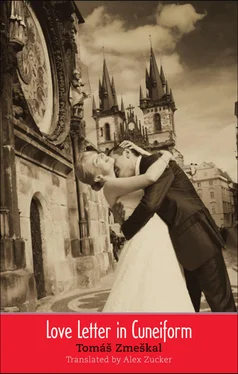“I will never cease to admire the untainted purity of youth, along with the purity of dilettantism and the purity of the Immaculate Conception.”
“ Credo quia absurdum! Absurd, please, absurd … meaningless, meaning without any apparent reason, but meaningless isn’t barbaric!”
“Of course, credo quia absurdum was also a help to me back then.”
“And …”
“Back then, yes … And then the secretary of the local Communist Party heard about Klára’s abilities.”
“…?”
“First he held a hearing in the chief physician’s office. The chief physician was pretty surly, but he stood up for his patients. So the secretary called the hospital director onto the carpet, and the director sent the chief physician away for a long fellowship at a research institute where he had been rejected several times before, and while he was away, installed a man who was indebted to him as acting unit head.”
“How come the rest of you didn’t put up a fight?”
“I was pretty good friends with the attending physician, so I knew he had done absolutely everything he could. In the end the secretary ordered them to increase the number of shocks to boost her ability to prophesize, and my friend refused.”
“What happened?”
“He was temporarily transferred to another unit that had a shortage of doctors.”
“They could do that?”
“They can always do almost anything. You know what Tacitus wrote: Rara temporum felicitas, ubi sentire quae velis, et quae sentias dicere licet .”
“What does that mean?” Jiří asked.
“It means: ‘Rare are the happy times when you can think what you want and say what you think.’ We were just too close to the Russian border.”
“That’s a funny …”
“Excuse?” Jiří shrugged. “Maybe you’re right and we were just making excuses because we were scared. But anyway, meanwhile Klára’s … fame, I guess is the best way to put it, spread through the nursing staff and people started paying her respect.”
“How do you mean?”
“I noticed the nurses who worked on her unit started getting little gifts from people. Klára started getting gifts too, and flowers, lots of flowers, which she in turn gave to the other patients. They also started showing not exactly respect toward her parents, but something like it. I’ve never encountered anything like it, before or since.”
“Sounds like mass hysteria.”
“That occurred to us too. But …”
“But what?”
“There were the results. Before the Communist secretary had a chance to interfere, we ran a few tests on Klára.”
“What kind of tests?”
“Her attending physician, the chief physician, and I each came up with a question that we posed to her. Then we wrote down her answers and put them all in a safe.”
“What were the questions?”
“The chief physician asked what type of degree his son would receive. Martin, her attending physician, asked who would fill the vacant position on our unit, and as for me, I asked when my sister would get married.”
“And …?”
“She said the chief physician’s son wouldn’t graduate, which was strange, since he was an excellent student, but then it turned out he was having a relationship with a woman that his father, the chief physician, didn’t approve of, so the son left home, dropped out of college, and never returned to his studies. As for the position on our unit, it went to an excellent doctor from the next district over, who had gotten divorced and needed a job that came with an apartment. There was no surprise there, since he was clearly the best candidate. Well, and what she said about my sister also turned out to be true.”
“And after that?”
“Once they sent the chief physician away to do research and transferred Martin, her doctor, I didn’t have access to Klára anymore. They had brought me in because they thought I could be useful, but without them around, there was nothing for me to do. And her new attending physician made that crystal clear to me.”
“But you must have done something.”
“Yes, but I didn’t like it. It looked like they were starting to give her drugs that made her condition worse, and nobody knew exactly what was going on. I also heard she was starting to have epileptic seizures. Friends and relatives of all the influential Communists were streaming in and out of there, and it was obvious they were asking her about their future. She would wake up afterward and not remember a thing. For them it was perfect, but from a long-term point of view it was clearly harmful to her health.”
“So what did you do?”
“One day I waited for her down in the park. I sat next to her for a long time, wondering how to begin. I didn’t want to dig a hole to fill a hole. I didn’t want to cause her any more trauma. So I just started in to the best of my conscience, being as neutral as I could. Or what I thought was neutral. I started by asking the name of some of the flowers in the flower beds. She answered. It wasn’t until I was sitting next to her like that, close enough to touch, that I realized for the first time how beautiful she was. At that moment I felt all the familiar symptoms that indicate not a myocardial infarction, but unfortunately that incurable emotional affliction against which no vaccine has yet been found.”
“And what about her?”
“Well, I was sitting there on the bench next to her and all of a sudden she said: ‘Why? Why all this?’ And it dawned on me that she understood what I was thinking and feeling. It wasn’t clear to me yet, but apparently it was to her. Because a moment later, she added: ‘It isn’t going to work. Forget it, Doctor.’ ‘What?’ I asked. ‘Is it really that bad?’ she said. ‘My God, why do people act like that? Haven’t I had enough already?’ Then she got up and walked away. I tried to get her out of the hospital. I tried to get them to stop the electrotherapy, but it was no use. Finally I went to see the Communist secretary. I thought he would throw me out as soon as I walked through the door, but he didn’t. He listened to me a while, asked me some questions, then told me he would look into it. I was surprised. Two days later the director of the hospital called me in and yelled at me for about half an hour, saying if I was going to complain to the Party secretary, my up-and-coming career wouldn’t last for long, he would see to that personally. Then, still screaming at the top of his lungs, he told me Klára had been released, so I could do whatever I wanted with her. When he finished screaming, he asked in an offhand way whether the secretary had asked any questions about pavilion seven. ‘No, he didn’t,’ I replied. I was happy. The next day Klára was released, and a few weeks later I persuaded her to start again somewhere else, and found something for her in Bratislava through some people I knew. When the unit head returned from his research residency and I told him what had happened, he said: ‘Do you know what’s going on in Seven?’ I started to tell him what I knew from the hospital’s internal documents, but he cut me off. ‘That’s the official version.’ ‘Is there some other version?’ I asked. ‘No, just that one,’ he said, and shrugged. As he was making his rounds the next day, he stopped me on the staircase, looked around to make sure that we were alone, and said: ‘Don’t ask anyone what’s going on in Seven. There are terrible things going on there. They bring people in and … and … do terrible things to them. I think they were afraid that Klára was going to stir something up with all those quaint symptoms of hers, so they let her go. That’s how come the director was asking you about Seven.’ ‘So what’s going on over there?’ I couldn’t help myself. ‘Don’t ask anyone,’ he repeated. ‘It’s terrible what’s going on. None of us would want to end up in there. They’ve got the whole thing under wraps, the secretary, the director, all of them.’ I continued to see Klára off and on for a few more years, but then I realized that seeing me kept reminding her of what had happened in the woods. So I banned myself from having any more contact with her. I had to. It was best for her.”
Читать дальше












